New Brunswick, Canada – November 2019: North American youth of La Via Campesina united in a regional youth gathering in New Brunswick, Canada to strengthen the region’s youth articulation. We are peasants, farmers, indigenous peoples, and allies from the lands we know as Canada, Mexico, and the United States, representing the National Farmers Union and Union Paysanne (Canada); Border Agricultural Workers Project, Farmworker Association of Florida, National Family Farm Coalition, Comite de Apoyo Trabajadores Agricolas, Why Hunger, Southeastern African American Farmers Organic Network , Family Farm Defenders (United States), La Organización Boricuá de Agricultura Ecológica (Puerto Rico), Unión Nacional De Organizaciones Regionales Campesinas de Mexico (Mexico), and the People’s Agroecology Process (Canada, US, Puerto Rico).
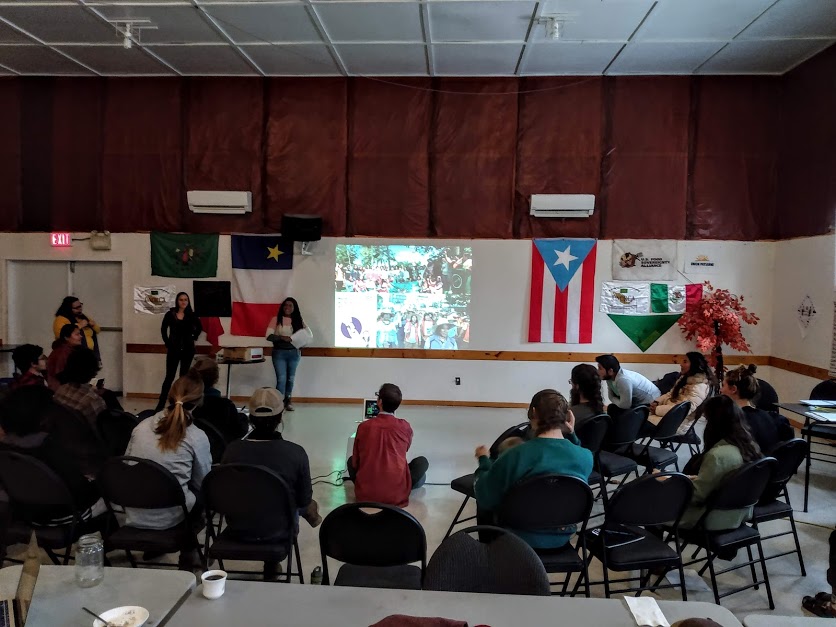
We gathered with the intent to enhance our collective capacity to transform food, farming and rural culture, towards agroecology and food sovereignty at local, regional and international levels. The Youth Articulation of La Via Campesina is focused on the critical process of bringing youth together to exchange ideas, share opportunities and struggles, and develop strategies that give voice to our collective challenges and needs.
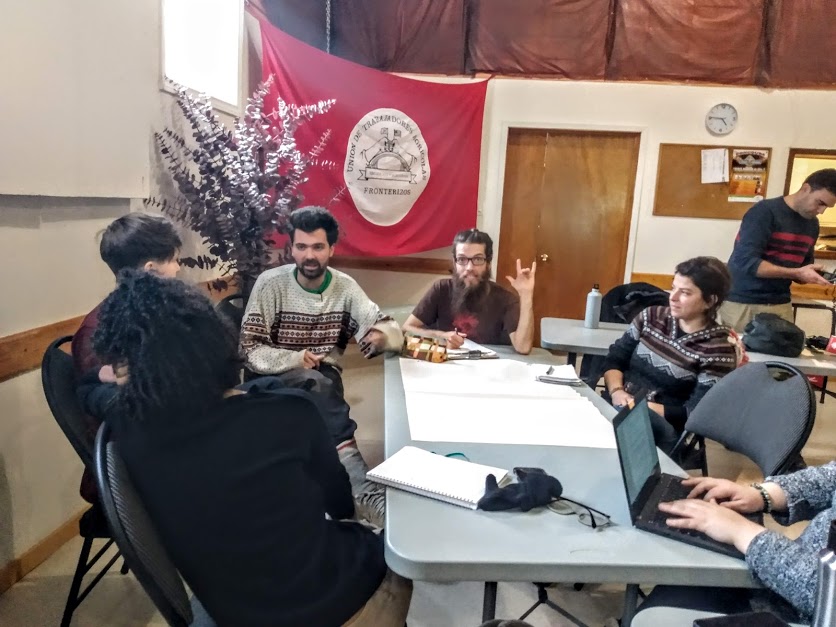
Over the course of 3 days, our ambition was reflected by the breadth of issues, challenges, and opportunities delegates brought to the floor for debate and exchange. The gathering was honored to be opened by Mi’kmaq community members, whose participation grounded our experience in the region and the territorial history of colonization and exploitation of indigenous peoples in North America. Throughout the encounter, facilitated sessions on Climate Justice, Land and Agrarian Reform, The UN Declaration of Right of Peasants and Other People Working in Rural Areas (UNDROP), and Popular Peasant Feminism were woven in with Mi’kmaq and Acadian history and culture. Attendees also benefited from presentations from local farmers, successfully elected to local political offices, demonstrating the importance of farmer voices in formal policy-making spaces. Finally, we visited Natoaganeg Community Food Centre, the first Indigenous run Community Food Centre in Canada, to experience what food sovereignty means for members of Eel Ground First Nation.
Climate Justice
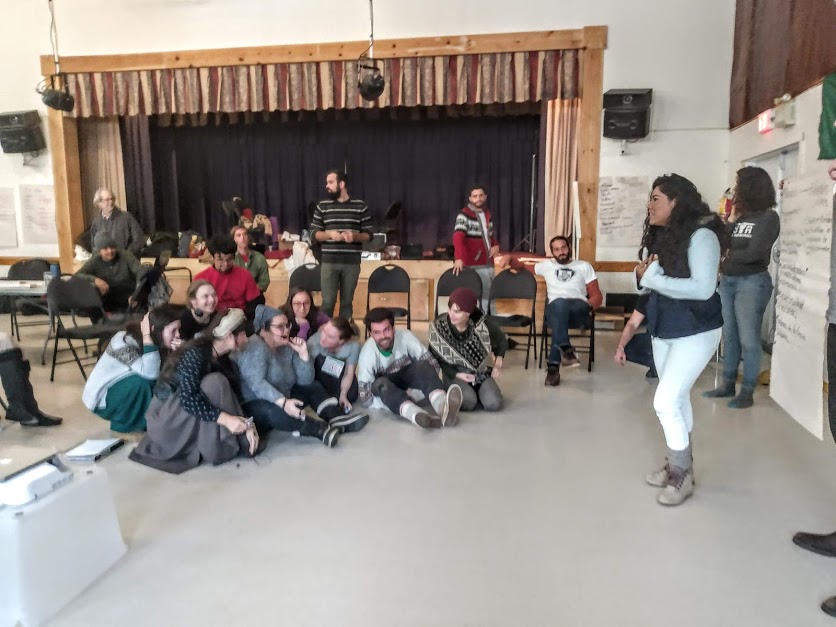
We recognize that the causes of the climate crisis are rooted in an extractive economy that since colonization has used genocide, slavery and government treaties to disposess Indigenous peoples of their natural resources. We recognize industrial agriculture as a leading causes of climate change. We as youth of LVC strongly oppose the industrial agricultural system that is controlled by corporations, is destroying our ecosystems, and that depends on the exploitation and dispossession of Indigenous peoples and people of color. One youth came forward with his community’s struggle, and shared his vision of reparation – Degrowth, which asks the ultimate question “How can we live together and together with nature?” instead of “How can we grow?”
The lens of climate justice is critical because it prioritizes the needs and solutions of frontline communities, those most affected by climate change and the least responsible for it. The Just Transition framework provides a roadmap from the current extractive economy towards a regenerative economy, based in cooperation, regeneration, caring and sacredness, ecological and social well-being, and deep democracy. There are many false solutions to the climate crisis – these include anything that continues to extract wealth and concentrate power; poisons, displaces or imprisons communities; or reduces climate crisis to a technological problem. We identified true solutions to include agroecology, food sovereignty, solidarity with indigneous peoples and other marginalized communities internationally, zero waste, affordable housing, and public transit. We call on our organizations, LVC, and our wider communities to fight for true solutions to the climate crisis and utilize Just Transition to ensure no one is left behind. We call for the implementation of holistic solutions, led by frontline communities, that are contextually situated, to disintegrate the powers of colonialism and extractive capitalism.
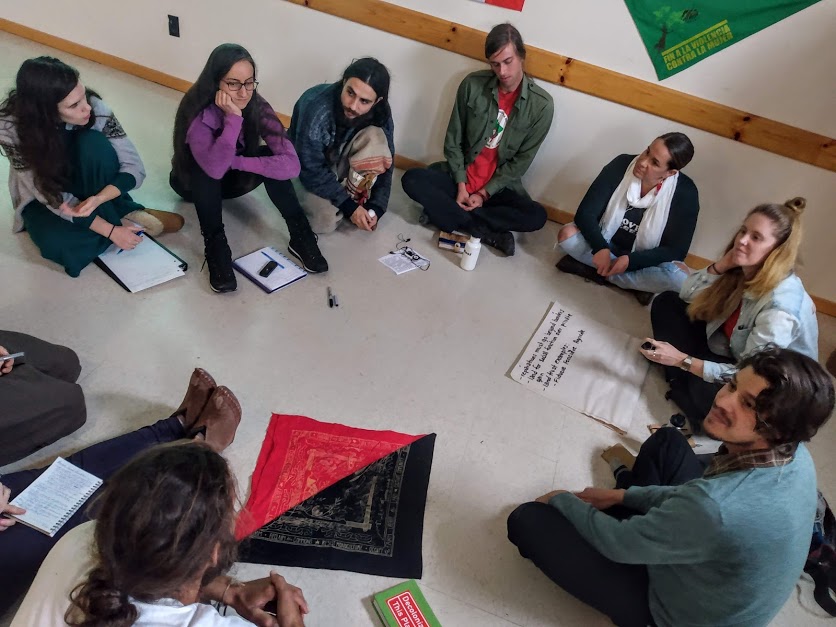
Land and Agrarian Reform
As youth, our greatest wealth does not come in the form of financial capital. Rather, our richness lies in our collective capacity to live and build a more fair and just world, by integrating an ethos of reform in our daily work and simultaneously beyond the farm gates. We see the whole as being greater than the sum of its parts, and collective farming models give us the opportunity to heighten our capacity as farmers and leaders of societal change. We recognize the need for complete economic restructuring – and this necessitates stewardship of an economy as a complex ecosystem – utilizing many forms of capital/capacity. LVC youth engage in the difficult and necessary work of righting historical wrongs that continue today – but we need more hands, heads, and hearts working for this. We need support in accessing land, moving beyond land ownership, and decolonizing our food system. We call for reparations and return of stolen land to bring greater equity and justice.
While Mexican youth see the viability of their ancestral agricultural communities crumbling, the temptation for many is to turn to crime and trafficking; while governments continue to prioritize regulations that consolidate power in agribusiness and export driven economies; and while approximately 75% of Canadian farmers expect to retire and sell their land in the next 10 years, we recognize the desperate need for Land and Agrarian Reform and we call on our government to enact policies that will ensure access to land for the next generation of responsible stewards and food providers.
Popular Peasant Feminism
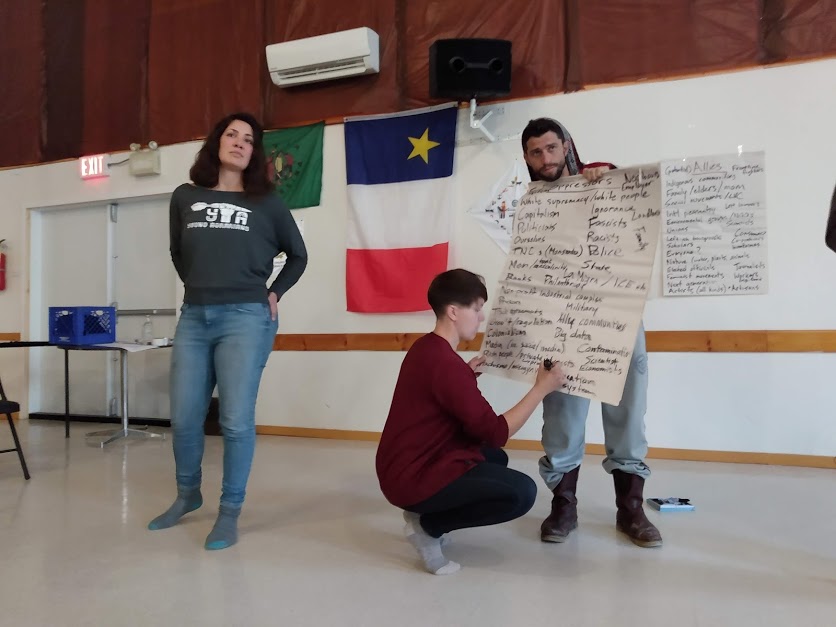
We studied the history and struggle of peasant women within La Via Campesina globally. We learned about the diversity of feminist perspectives and struggles that are rooted in the specific experiences of women-identified and non-binary peoples across the different regions. We also affirmed the power in uniting for a peasant and popular feminism that recognizes the contributions of women-identified and non-binary peoples as core to the struggle for food sovereignty and a world beyond capitalism. We youth from the North American region identified four areas of struggle to challenge patriarchy and captitalism: fighting violence against women, promoting the intergenerational transfer of land to women, challenging the nuclear family as the primary unit and creating a more inclusive and cooperative understanding of what constitutes the “family farm”, and challenging the patriarchy and machismo within our own organizations and movements. Each of these four areas were addressed through the tool of “Theatre of the Oppressed” where we worked together to problem solve and see ourselves as agents constructing our collective future. Furthermore, we agreed that there is a need to envision and build new relations between genders that challenge the heterosexist and patriarchal gender binary. There was a call by men-identified people for more action to challenge patriarchy, and for all of us to create organizations where LGBTQ2S people can speak openly and define priorities as part of our collective movement.
We recognize building a feminist movement that comes FROM the people FOR the people is a critical task that we as youth have for pushing our organizations and LVC toward inclusion of diversity, deconstructing patriarchal hierarchies, and decolonizing our processes. We call on our organizations, LVC, and our wider communities to move beyond gender binary and to fully recognize and celebrate the wisdom that comes with diversity.
UNDROP
The UN Declaration on the Rights of Peasants and Other People Working in Rural Areas (UNDROP), adopted by the UN General Assembly in December 2018, is an international tool that LVC has worked for years on, to assert peasants voices defending food sovereignty, the struggle for land, and agrarian reforms. It promotes agroecology and defends local seeds, peasant rights and the struggle against the criminalization of peasants. We call on our nations to endorse UNDROP in national law.
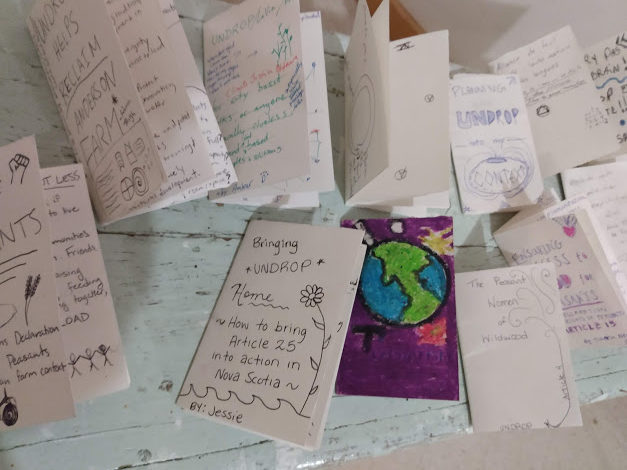
People’s Agroecology Process
The People’s Agroecology Process (PAP) is a grassroots initiative led by BIPOC (Black/Indigenous/People of Colour) and those working the land to scale out agroecology in the US, Canada and Puerto Rico. PAP is aligned with the pedagogy and methodology of LVC to build political force to challenge corporate control of industrial agriculture. Agroecology encounters are a fundamental methodology and strategy to build political force and movement. These encounters centre BIPOC communities who understand the long term knowledge of working the land and hold the solutions to collective struggles. An international PAP encounter is being planned for 2020 in North America. We know agroecology is a path towards food sovereignty and freedom. We call on our organizations to participate in this formative international encounter, and for our wider communities to support this vital work.
We, the La Via Campesina Youth, do no isolate ourselves in the struggles we face in building a movement toward a more just and equitable world. Though the enormity of these challenges may confront and test our stamina, we do not lose hope nor conviction because we understand we are all threads in the same story. Though our hands work in different soils, we are all on, and of, the same Earth. When we gather together, it is for us to help remind one another that we are weaving a tapestry that needs to withstand and endure the reprisal and retaliation of a crumbling paradigm that many will continue to defend with a conviction that matches our own. We tread with hope and conviction because we understand the collective right to practice peasant agroecology is not just for the benefit of our future, but for the collective future of all things.
